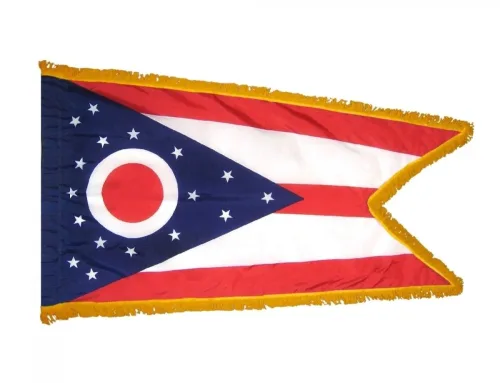By Richey Piiparinen.
Some people hate the term “Rust Belt” because of its loaded connotations of decay. For others, the term is a source of pride. I am in the latter camp. But I often cross paths with those who loathe the term, as well as any notion of a Rust Belt culture.
For instance, I recently ran into a top official for the City of Cleveland. We shook hands and discussed backgrounds before she recognized the title of a book I co-edited, Rust Belt Chic: A Cleveland Anthology, a collection of stories detailing what it means to be a Clevelander and a Rust Belter. The official told me she didn’t care for the term “Rust Belt,” and found the idea of celebrating a Rust Belt culture backwards and distasteful. I told her there was a new generation taking ownership of the term, having grown up in a post-industrial reality. The official insinuated those people are not in positions of power, so they do not matter. I responded that in ten years many of them will be in power, and so they matter a lot.
The conversation stayed with me for a few weeks, because it was an example of a mindset that needs to go in Cleveland and the whole of the Rust Belt: shame and false pride. The two characteristics go together. Said philosopher Lao Tzu:
Pride attaches undue importance to the superiority of one’s status in the eyes of others. And shame is fear of humiliation at one’s inferior status in the estimation of others. When one sets his heart on being highly esteemed, and achieves such rating, then he is automatically involved in fear of losing his status.
Shame is pretty thick in these parts, Those who hate the term “Rust Belt,” find the phrase shameful. After all, rust connotes disuse and being left behind. For them, the term fails to capture our proud status. Our forefathers and foremothers helped build this country. They helped protect this country. They helped enable the defeat of Hitler.
Before it was “Rust Belt,” this region was called the “Arsenal of Democracy,” a term coined by Detroiter Bill Knudsen in conversation with a weary and worried President Roosevelt on the eve of WWII. At the time of the talk, May 28th, 1940, America had the 18th largest army in the world. What FDR needed from Knudsen was reassurance that Detroit’s industrial infrastructure could produce weapons at an explosive pace. Knudsen replied that Detroit’s manufacturing might would be able to transform into the country’s “Arsenal of Democracy.” The term eventually gained traction after an FDR fireside chat dated December 29, 1940. In it, the President states:
We must be the great arsenal of democracy. For us this is an emergency as serious as war itself. We must apply ourselves to our task with the same resolution, the same sense of urgency, the same spirit of patriotism and sacrifice as we would show were we at war.
Obviously, the region succeeded in becoming the hub of weapons manufacturing. Pittsburgh produced one-fifth of the Allied forces steel between 1940 to 1945.
The region had much to be proud of. But then new macroeconomic forces took hold. The economy globalized, and the way many in the Rust Belt lived, and the jobs many had, became obsolete. Shit happened. Shit is still happening.
The problem is that many cannot let go of the past. They have gone from being proud of being part of the “Arsenal of Democracy” to being stubborn that we still retain this status. This is particularly true for the region’s leadership, which hangs onto the illusion that yesterday will occur again as long as we adhere to the same thought processes and power structures that held during the region’s heyday. But yesterday doesn’t happen. Year after year, it doesn’t happen. Pride becomes desperate. What the leadership really feels is not pride, but shame at how the region has stumbled.
This shame leads to desperate attempts to improve the region. Leaders proclaim that casinos will save the cities. Or convention centers will save the cities. Maybe beautifying will save the cities, or outdoor chandeliers (actually happening in downtown Cleveland). Perhaps the answer is in a suburban-type downtown mall, or a tech district, or a critical mass of microbreweries and boutiques. Or whatever anyone else is doing.
These city transformations erode the region’s true competitive advantage, which is the potential inherent in Rust Belters ability to persevere through the downturn. It neglects to take advantage of our learned resilience. Writes Erie, PA native and economic development blogger Jim Russell:
What I mean is seeing opportunity hiding in a community struggling with survival. There’s just something about Youngstown that stirs passion in me. I’m not gawking at ruin porn or glossing over everything that is wrong. I love Rust Belt cities. I love Rust Belt culture. I’m proud to be from the Rust Belt. That’s what Rust Belt Chic now means to me. It’s personal. It’s who I am.
For Pittsburgh, I could sense the tide turning. I see the same transformation taking place in other Rust Belt cities. A pejorative, Rust Belt-ness is an asset. It’s a starting point for moving forward, not a finish line or a civic booster campaign.
There is a growing movement of Rust Belt pride taking hold, of which I am a part. It is not false pride, but a pride derived from accepting that the region has become rust. This “rust belt chic” movement is immeasurably beneficial to the psychogeography of the region. After all, as William James put it, “Acceptance of what has happened is the first step to overcoming the consequences of any misfortune.” We need to take pride in being part of the “Rust Belt” in order to move forward.







Well stated, Richey. To me, trying to bury the term Rust Belt (and its connotation) is like telling John Lee Hooker to stop using that depressing term “Blues” and hit the studio wuith Britny Spears’ producer. We earned it; we get to define it.
Love it. I’m proud to live in the rust belt. I see it as becoming prosperous as a “megalopolis” rather than a bunch of cities and metro areas attempting to revive independently. If all the cities around the Great Lakes can come together and plan intelligently, this will be where everyone wants to live. We just need to start thinking like we’re already there.
I have to admit I’m tired of the term, but like the beggars holding signs at the bottom of the expressway ramp, I guess I’ve learned to live with it. But then I remember that rust isn’t permanent. It’s simply a slow transformation of one thing into something else.
The thing I see–and Detroit is probably the primary example–is that the best of the old is being preserved and the rusting, decayed, outdated and irrelevant is gradually being hosed away, leaving a clean blank canvas that we can work with.
Perhaps another analogy is that the region is transforming into a type of New Frontier, or Wild [mid]West. It’s not pretty. Maybe a little dangerous at times. You have to be tough to make it here–but the opportunities are wide open…
Excellent writing here, looking forward to seeing more GoodThings from Belt Magazine. Thank You. regards greg
Mr. Piiparinen asserts, “There is a growing movement of Rust Belt pride taking hold, of which I am a part.” Aside from his own feelings and those of Jim Russell cited earlier in the post, what evidence does he have of such a movement?
Never hear the term anymore except in political context. It seems to be a tired old characterization, which isn’t relevant any more. The manufacturing jobs are gone. They are not coming back. Health care is the dominant industry.
Why not use a term which has long been associated with the Midwest: “America’s Heartland”
It seems more appropriate on m multiple levels.
Amen, brother. Rust Belt is inaccurate, offensive, and seems to be embraced by neckbeard types who want to open another IPA factory in the old welding shop. The Potemkin Village “rebirth” of Detroit is a by-product of this fad – and is false. We adults are doing what we need to do to continue living in a real landscape that the tattooed beardos would like to charmingly caricature.
The best, simplest and most accurate term for the region is “Great Lakes”. That’s how I refer to it as a lifelong resident (Clevelander). It leads with Great, as this region is truly magnificent. Why do we take our greatest asset for granted around here? Rust Belt is simply too loser-ish, despite the well-intentioned push to make the term chic. You just can’t. Give it up.